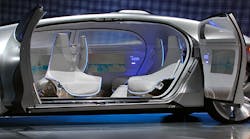The vehicle could be the office of the future.
Mercedes on Monday unveiled its F 015 concept car, an autonomous luxury vehicle designed to be a mobile living space…or workspace.
“I believe the best times are still ahead for the car,” Daimler Chief Executive Officer Dieter Zetsche said during his keynote address at the International Consumer Electronics Show in Las Vegas. “Because in the future the car grants access to the single most important luxury goods of the 21st century: private space and quality time.”
The electric luxury sedan features four lounge seats that can swivel to face the other occupants or the road, and can be operated autonomously or manually.
“This technology will give everyone inside a car entirely new opportunities to spend their precious time: browse the web, sleep, work,” Zetsche said.
“Cars will turn into mobile homes in the very best sense of the word. They will be exclusive cocoons on wheels that enable people to do exactly what they want or need to do.”
While the F 015 won’t be a commercially viable reality until the next decade, vehicles with semi-autonomous features like parking assistance and collision avoidance are already in showrooms and on the roads.
And we’re only five years away from 2020 – the year by which several major automakers have vowed to bring an autonomous car to market.
How Safe are Self-Driving Cars?
The National Highway Traffic Safety Association reports that about 93 percent of crashes are the result of human error. It seems to follow then that removing the driver from the equation would eliminate most accidents.
Not so fast.
It’s inevitable that crashes will occur, raising the question of where liability lies: with the automaker or with the driver? The prototypes of driverless cars can still be susceptible to hazardous weather and dangerous driving conditions, and there are always outside forces impacting the safety of a drive. Not to mention the potential for a computer-driven vehicle to malfunction.
However, automakers from Mercedes to Ford to Tesla are working to conquer those problems. The biggest hurdle, it seems, is public acceptance of the technology.
"To pave the road toward autonomous driving, we have been constantly introducing new driver assistance systems to our cars. By getting used to more support from the car, our customers will gain trust in the new technology," Zetsche said.
States like California and Michigan already have passed legislation permitting autonomous vehicles.
